Tackling Green Transition in the Health Tourism Industries
Summary: The economy in Hajdú-Bihar is strongly influenced by tourism. Due to the landscape, traditions, thermal waters and the knowledge of the University of Debrecen, there are many opportunities and services for recreation, sightseeing, fishing and hunting, gastronomic and cultural events as well as conference and business tourism. The natural thermal springs of Hajdú-Bihar form the thematic core of tourism and represent a special potential for the region. On the one hand, enterprises and actors in the field of health-oriented tourism rely on this potential, and on the other hand, actors in the energy sector also use thermal water resources as a source of energy. The Tourism and Thermal Health Industrial Cluster initiative works with regional development authorities to improve the (digital) infrastructure and facilities of the spas and helps businesses to become more attractive and efficient. A key success factor of the cluster initiative is that most of the health tourism stakeholders in the region are members of the cluster, which enables demand-oriented and targeted development activities for the region. The long-term objective of all relevant regional development strategies is to make both the regional industry and the spa tourism sector more sustainable. To this end, the cluster initiative is working on a holistic approach to the use of thermal resources in the region, both in the wellness sector and in the field of renewable energies, in order to create a circular economy.
The Hadjú-Bihar County
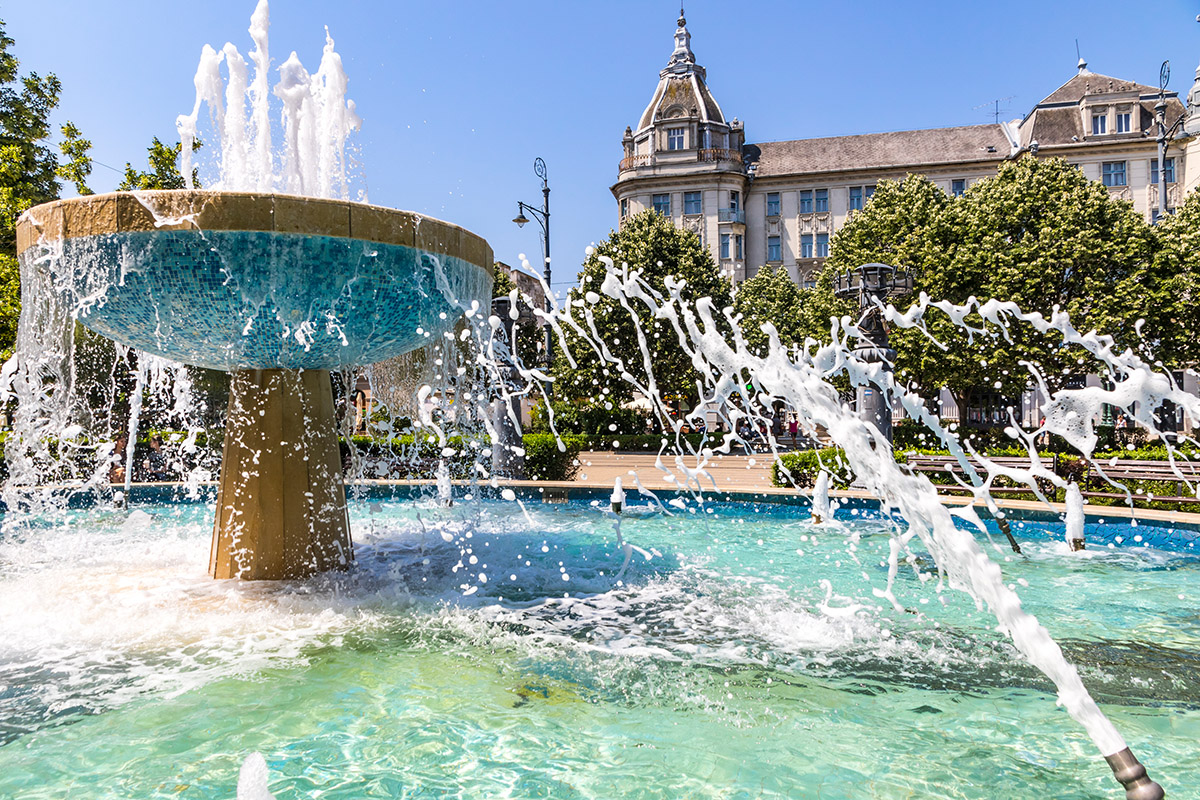
The Hajdú-Bihar region is located in the east of Hungary and forms with Debrecen, the country's second largest city, an important economic centre. In terms of size, the county accounts for almost 6.7% of the territory of Hungary, but only 5.4% of the resident population. Of the approximately 527,000 inhabitants, about 39% live in Debrecen, which is why the population density in the other municipalities of the region is well below the national average. Accordingly, there are clear regional disparities between the urban centre of Debrecen and the rural areas.
The Hajdú-Bihar region has always been an important centre of trade, education and culture. It has a long and strong tradition of self-government, multiculturalism and openness to the introduction of technological innovation. Due to its location in the Great Hungarian Plain, the region was originally strongly influenced by agriculture. More than 73% of the region's land is cultivated. Agriculture is therefore an important part of regional value added. In terms of industrial value added, the chemical and pharmaceutical industries, mechanical engineering, the food industry and the energy sector are the most important. In recent years, the IT sector has also become increasingly important, especially in Debrecen.
The economy of the county is strongly strengthened by tourism. Favoured by the landscape, traditions, thermal waters and the knowledge available via the University of Debrecen, there is a wide range of opportunities and services for recreation, sightseeing, fishing and hunting, gastronomic and cultural events as well as conference and business tourism here.[1] Hadjú-Bihar is classified as an emerging innovator in the European Commission’s recent Regional Innovation Scoreboard (see figure 1).
At the political level, four strategic industrial transition documents have an impact on the region, each starting from a different spatial planning level. On the one hand, the country, which has a strong political influence on the development of the regions in Hungary, has defined goals for the Hajdú-Bihar region in the national RIS3 strategy 2021-2027. These objectives are in turn applied to the NUTS II region of Észak-Alföld, in which Hajdú-Bihar is embedded, in the local Smart Specialisation Strategy (S3). At the same time, there are development strategies for the region of Hajdú-Bihar and specifically for the city of Debrecen until 2030.
A central development goal that emerges from the national RIS3 strategy is to further develop Hajdú-Bihar as a knowledge region by 2027. The following contents are defined:
- Further strengthening knowledge centres
- Enhancing the professional excellence of R&D,
- Stimulating RDI activity in the business sector through ecosystem development and expanding cooperation between the two sectors to give regional players competitive advantages that will put them at the forefront of international developments
- Strengthening the university-centred innovation ecosystem by developing research infrastructure capacities, increasing the number of researchers, expanding cooperation between regional actors (universities, research institutions, businesses, non-profit organisations) in order to strengthen the weight of the local ecosystem within the country and improve the international competitiveness of regional RDI capacities
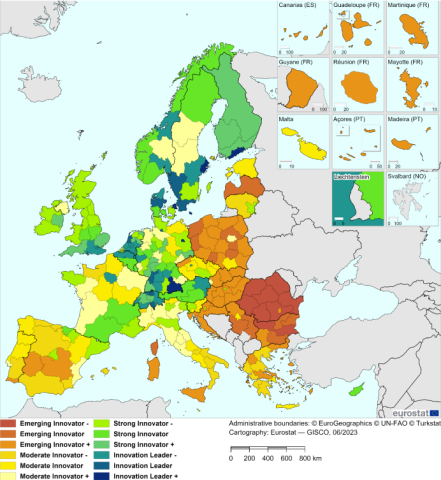
[1] Municipality of Hajdú-Bihar County; https://hbmo.hu/portal/category/english-clist/
INDUSTRIAL ECOSYSTEMS
The Hajdú-Bihar region has formulated the following vision in its strategic programme for the region, the Hajdú-Bihar County Regional Development Programme 2021-2027:
“Hajdú-Bihar with its strengthened regional role in the territorial reorganisation processes of the Carpathian Basin, - building on the growing regional role of Debrecen, - a dynamic and modern economy with high added value and a developed innovation ecosystem, which is a responsible, forward-looking county based on conscious planning, committed to the conservation and sustainable use of its natural and cultural resources, and open to creative and innovative initiatives to provide its citizens with a liveable environment and a responsible community.”
As a result of a thorough Entrepreneurial Discovery Process (EDP), S3 sectoral priorities have become more focused:
- A healthy society and prosperity
- Advanced vehicle and other engineering technologies
- Clean and renewable energies
- Sustainable environment
- Healthy and local food
- Agricultural innovation
Accordingly the prioritised industrial ecosystems are:
- Agriculture and processing industry
- Functional food industry
- Vehicle and machine industry
- Health industry
- Pharmaceutical industry
- Electronics and IT
- Environmental industry and biotechnology
STRATEGIC CHALLENGES
In the future, the region aims to manage the transition to a more digital, industry- and service-oriented economy and is focusing on stronger links between stakeholders for knowledge transfer and competence building. At the same time, the region faces the challenge of decentralising economic value creation in order to promote economic development in the regions outside Debrecen. Due to its geographical location and natural characteristics, the region faces major challenges with regard to climate change, especially as the agricultural sector is a central economic pillar in the region. In order to combat the effects of climate change, the region is relying on the development and increased use of renewable energy and is focusing on the potential of geothermal energy.
The Hajdú-Bihar County Regional Development Programme 2021-2027 formulates the following three strategic objectives, to meet the future challenges and develop the region sustainably:
1) a dynamic and modern economy in Hajdú-Bihar
2) An adaptive and healthy society, strong communities
3) Harmony between nature and humans in Hajdú-Bihar
CLUSTER POLICY and CLUSTER LANDSCAPE
In Hungary, cluster policy is within the responsibility of the national government. Strategic direction and funding are determined centrally, as are evaluation and monitoring. Hungarian cluster policy has its origins in the early 2000s. Hungary was the first country in the Central and Eastern European region where the national government supported the development of business cooperation and clusters. In 2007, the first official cluster policy was established in Hungary. During this period, clusters were supported at all stages of development – start-up clusters (initial stage), regional clusters (deepening cooperation between individual partners) and accredited clusters (joint R&D&I projects, solid relationship based on trust) – thus supporting the overall (further) development of the cluster landscape. Following an evaluation of this broad support, the eligibility criteria were tightened in order to target promising cluster initiatives. Accordingly, the conditions for obtaining the “Accredited Cluster” label have been modified, so that active cooperation between members, professional cluster management and international presence are more important than before (see figure 2). The Hungarian government is currently working on a revision of its existing cluster policy.
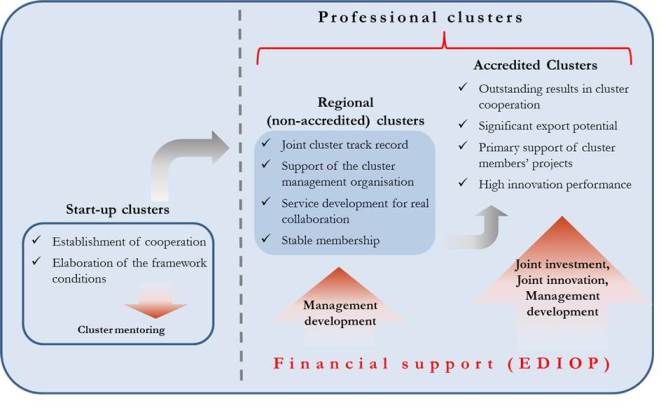
Cluster development model 2014-2020; Source: ECCP (2017): Evolution of cluster policy in Hungary - 2000-2020, https://clustercollaboration.eu/news/evolution-cluster-policy-hungary-2000-2020
As the regional government of Hajdú-Bihar has little influence on economic policy decisions, it has little financial and political influence on the cluster initiatives in the region. However, the cluster initiatives have been heavily involved in the formulation of the Regional Development Programme 2021-2027 and are mentioned here as a key component for successful economic development.
Under strategic objective 1 of the region's development strategy, an intervention is defined that declares clusters as an indispensable means of knowledge transfer and information exchange, especially in the field of digitalisation and sustainable development.
There are currently five clusters in the Hajdú-Bihar region, all of which are labelled as accredited clusters and correspond to the industrial focus of the region:
- Pharmapolis Debrecen Innovative Pharmaceutical Cluster
- Pharmapolis Innovative Food Cluster
- Regional IT Cluster Silicon Field
- MSE Sport and Lifestyle Development Cluster
- Tourism and Thermal-Health Industrial Cluster
The insufficiently digitalised means of information and communication are seen as a major obstacle to the resilient development of the regional economy. The Regional Development Programme sees the role of cluster initiatives as central in this regard. Joining existing clusters or establishing new clusters could be an effective way to create modern digital communication and organisation systems. Strengthening the knowledge base and interaction between economic actors through the development of an appropriate framework can contribute significantly to the growth of the country's economic power and the creation and consolidation of new growth areas, thus having an impact on improving socio-economic processes at the national level.
THE TOURISM ECOSYSTEM
Before the COVID-19 pandemic the Hungarian tourism sector recorded a strong increase, especially in international visits (see figure 3). Tourism is strongly concentrated in Budapest, but there has also been an increase in the other Hungarian destinations. In 2019, accommodations in the Debrecen tourism area registered a total of nearly 769.2 thousand guests and more than 2.0 million overnight stays. The number of guests increased by 9.2% and the number of overnight stays by 2.2% compared to 2018[1].
The national government has a strong role in designing and developing the Hungarian tourism sector. It defines relevant subsectors and sets up geographically defined regions as Hungarian tourism destinations. These predefined destinations form the basis for the national support of regional tourism development. Therefor the national Act “CLVI of 2016 on State Responsibilities for the Development of Tourism Areas” states that the basic unit for tourism development planning is the destination. With the designation of new tourism areas, it is now possible to carry out the planning, implementation, coordination and communication tasks for each destination directly in the area. The aim is to make the fulfilment of tourism tasks more efficient by designating the areas and to create well-communicable and definable reception areas in line with the objectives of the National Tourism Development Strategy 2030 (NTS2030) -Tourism 2.0. A total of 11 Hungarian tourism destinations have been designated. One of them is Debrecen with its surrounding area.
On the national level, the National Tourism Agency is in charge of the implementation and development of the Tourism 2.0 Strategy, which is the guiding strategy for the holisitc tourism development in the country. The agency is creating a new structure for tourism management at destination level to ensure better use of synergies, networking and a coherent approach to strategy and communication. At the municipal level, the management of local tourism areas is carried out by TDM (Tourism Destination Management) organisations. In 2019, there were more than 90 TDMs nationwide, which were mainly in the form of municipalities and associations. Accordingly, the central challenge is a holistic approach to the region. Relationships between local and cross-community actors are not well established and there is generally no coherent strategy. This leads to a high level of diversity at the national level. Therefore, the work is currently focused on creating consistent structures within the destinations.
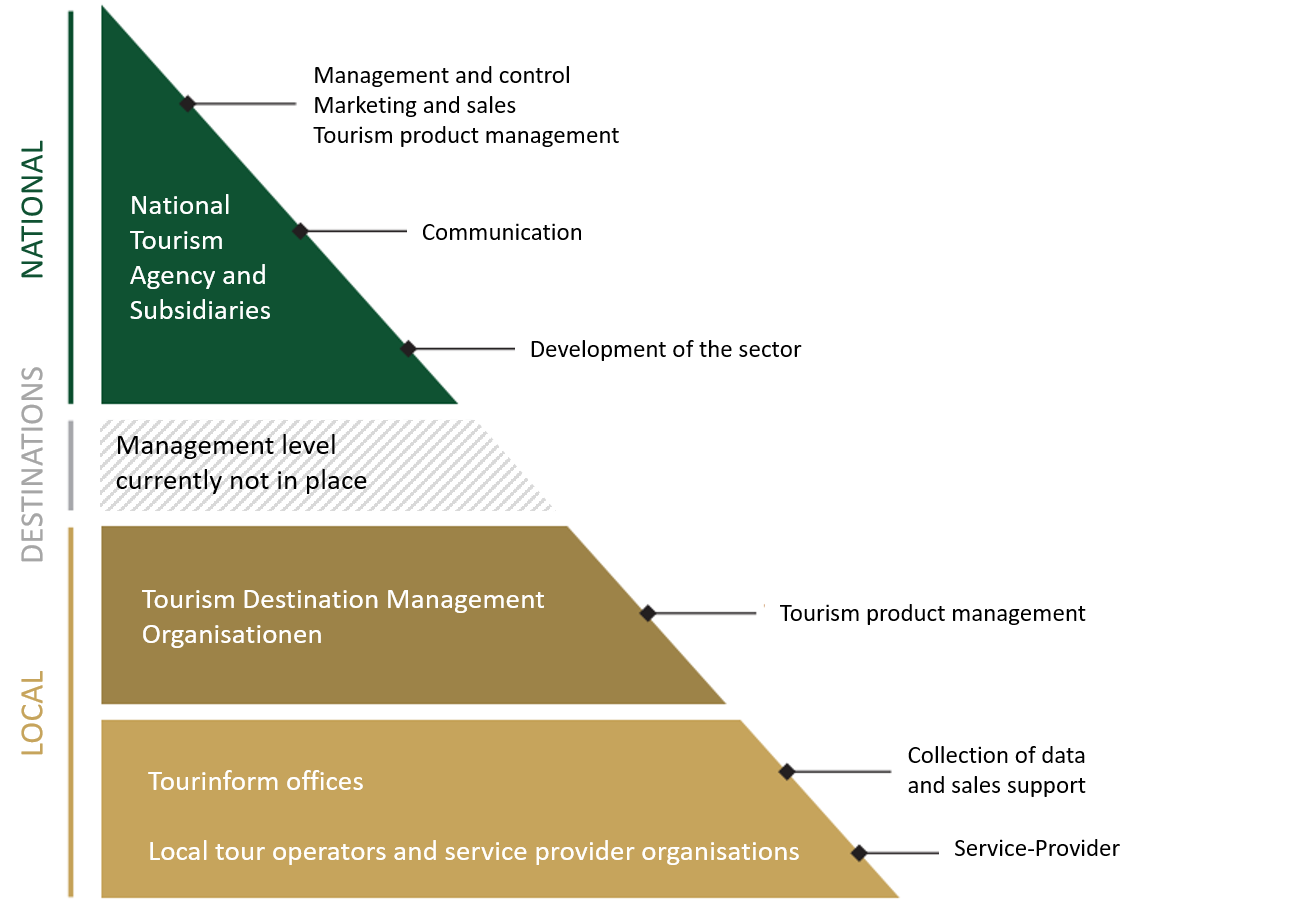
Source: Tourism 2.0 Strategy Hungary, p. 65. https://mtu.gov.hu/cikkek/strategia/
For Debrecen and the surrounding area, the City of Debrecen is mainly in charge of the touristic development. The main touristical sectors, the Tourism 2.0 Strategy defined for the Debrecen region are:

Source: Tourism 2.0 Strategy Hungary, p. 80
As the majority of tourists come from Poland, Romania, Germany, Ukraine and Slovakia, Debrecen's international airport has also gained in importance recently. From a demographic point of view, the tourism offers are mainly used by families with small children (fun water experience), young people or couples (city breaks / active and eco-tourism) as well as seniors (spa and wellness offers).In Hajdú-Bihar there are 14 baths and spas, which offer touris services and are relevant for the touristic development in the region.
The Tourism 2.0 Strategy also collected data about the criticism of tourist facilities in Hungary, including spas and baths. The main shortcomings of Hungarian spas in the eyes of users are hygiene and overcrowding and the resulting poor value for money. In addition, there are complaints about staff attitude and language skills. Staff training and the development of language skills are important breakthrough points, in line with the strategic pillars that have been. Furthermore the strategy aims to improve the digitisation processes in the sectors and to support the companies to become more sustainable and efficient. This is where the cluster can work together with regional development to improve the infrastructure and facilities of the baths and spas and support the companies in building a more attractive and efficent business.
[1] Hungarian Tourism Agency 2012-2020; https://mtu.gov.hu/cikkek/debrecen-es-tersege-turisztikai-terseg-1923/
Tourism and Thermal-Health Industrial Cluster

Today’s Tourism and Thermal-Health Industrial Cluster was founded in 2005 as Nothern Great Plain Thermal Cluster. As there was a second cluster organisation at this time supporting the touristic institutions in the region, called the Thermal-Health Industrial Cluster, and they had a strong thematic and operational overlap, both organisations merged to theThermal-Health Industrial Cluster in 2013. As the cluster aims at expanding its activities not only for health tourism stakeholders, but for a wider range of tourism suppliers, the name of the cluster changed to Tourism and Thermal-Health Industrial Cluster in 2023. The main objective of the cluster is to develop the thermal and medical tourism of the Nothern Great Plain Region. The cluster supports its members in making management processes more efficient and enabling partners to enter the international market. At the same time, cooperation between regional stakeholders is to be established, which will have a positive effect on further development. The natural thermal springs in Hajdú-Bihar form the thematical core of the cluster and represent a special tourism and energy potential in the region. On the one hand, businesses and actors in the field of health-oriented tourism rely on this potential, while on the other hand, actors in the energy sector also use the thermal water resources as a source of energy.
The strategic framework for the work of the cluster initiative is closely aligned with the corresponding development strategies of the Hajdú-Bihar region, but also with the National Tourism Strategy 2030. The goal of the 2030 strategy is to increase the share of health tourism of the total national economy by 20% and to increase its importance within the overall tourism consideration. Therefore, the strategy is based on four strategic development dimensions:
- Becoming a key player for Hungarian tourism as a whole and for the country's image
- A thematically differentiated guest experience at the country level with remarkable leaps in quality
- Strengthening economic sustainability through operational efficiency and digitalisation
- Promoting ecological sustainability
Since 2019, the INNOVA Észak-Alföld Regional Development and Innovation Agency provides services as the cluster management organisation of the Thermal Health Industrial Cluster. The cluster has the status of an “Accredited Innovation Cluster” and carries the Bronze label of the European Cluster Excellence Initiative (ECEI).
MAIN FEATURES
The cluster currently unites 31 members from around the county, most of them actively involved in the thermal health industry: Municipalities as operators of the regional spas, hotels, other accommodation providers, but also other members providing tourism-related or complementaryservices, such as regional energy and construction companies, cleaning companies as well as environmental offices. The University of Debrecen is an important pillar for promoting innovation within the sector. Thus, the cluster does not only cover the direct actors of health tourism, but also includes those actors in the network who are indirectly active for or in the sector. The cluster was founded as an association, which means that it is chaired by a Board, which is elected by the members. The current president of the Tourism and Thermal-Health Industrial Cluster, the former director of the Hungarian Tourism Agency North Great Plane Marketing Directorate, brings with her an extensive network and a high level of experience in the field of health tourism, also at the national level.
Currently, a full-time cluster manager and a part-time secretary work for the network. Through its affiliation with the INNOVA Észak-Alföld Regional Development and Innovation Agency, the cluster is closely linked to the activities of the innovation agency, resulting in good synergy effects between the two institutions. The cluster finances the operational business of the cluster manager and the office through the membership fees charged, which are about €430 per year for companies. The contribution of the municipalities is calculated proportionally according to the number of inhabitants of the respective municipality. In addition, the cluster organisation participates in national and European projects through which measures can be developed and financed, in particular:
- The project entitled “Best by Doing” financed by the ERASMUS+ programme aimed at spreading the excellence criteria for vocational training in the HoReCa sector, primarily in the health tourism and wellness industry. The project offered a solution for the development of appropriate content related to work-based learning and for bringing the relationship between students, schools and businesses to a new level. It emphasised the promotion of work-based learning, especially practical training. The aim of the project was to effectively prepare students participating in European vocational training for mobility in work-related learning and to create a successful resume that meets the criteria for professional qualifications and personal competences based on the needs of the industry, which will increase their employability in the wellness industry. Part of the project was the testing and implementation of a tool, based on innovative information and communication technology, which enables training outside the school system.
- In the frame of another project called “Sustainable development of tourism and gastronomy” also financed by the ERASMUS+ programme, the cluster organised two mobility programmes for cluster members and partners to learn good practices in the field of sustainable tourism and gastronomy and to support members adopting these good practices in their daily operations and in education materials.
SERVICE PORTFOLIO
The cluster intends to increase the sustainability and resilience of the regional thermal-health tourism in the long term through intensive networking among the stakeholders, but also through the integration of national and European competences. To achieve this, the cluster initiative offers its members the following services:
- BUSINESS CONSULTING
- EXPERTISE, PRODUCT DEVELOPMENT: Preparation of studies, technical materials, market research, development concepts
- ORGANISATION OF SPECIALISED CONFERENCES: thematic, specialised workshops, organisation of big thematic conferences
- ORGANISATION OF PROGRAMMES AND STUDY VISITS: Organisation of specialised programmes presenting best practices in national and international locations; organisation of regular networking, information and coordination meetings
- TRAINING: Trainings, vocational trainings, organisation of further training
- MARKETING SERVICES: everything about marketing – including publishing, Image film creation, planning and implementing online and offline campaigns, settlement marketing
- JOINT ACTIONS AT CLUSTER LEVEL: Development of a joint marketing strategy, joint appearances at exhibitions and fairs, production of publications and films, participation in study visits, appearing in a joint mobile application, participation in national and international projects
- PARTNERSHIP SEARCH AND HIRING: A regional, thoughtful, helping and supportive team where everyone can find the right partner for them
- MEDIATION OF SPECIALISTS: Placement of specialists with high professional experience required for daily operations in tourism and energy topics
- APPLICATION CONSULTING: Consulting for tenders, tender preparation and project management, project generation nationally and internationally
- REPRESENTATION of interests of the stakeholders of the tourism sector at political level
IMPACT
A key success factor for the cluster initiative is that the most important actors operating in the field of health tourism and based in the region are networked in the cluster. As a result, long-term developments can be offered in a targeted and demand-oriented manner, leading to a holistic development of the regional sector. Since its inception, the cluster has made important contributions to achieving the objectives of the National Tourism Strategy. In particular, supporting the infrastructural and service quality development of spas in line with the conditions determined by the National Tourism Development Strategy (NTS).
The cluster has also facilitated central objectives of the regional development and innovation strategy, such as “Healthy society and prosperity”, ”Clean and renewable energy” and “Sustainable environment” through the further development of the thermal water industry. More precisely, the cluster worked out a Sustainable Spa Development Concept of Hajdú-Bihar and Borsod-Abaúj-Zemplén Counties to determine the main directions establishing economic development generated by tourism in the two counties, as well as to establish the conditions of competitiveness, keeping in mind that sustainability must be a basic principle during further developments of spas. As it was mentioned before, the cluster organised international mobility programmes for its members to learn about good practices in the field of sustainable tourism and gastronomy, and helped the adoption of these practices in the daily operation of cluster members, as well as embedding these good practices in the education material used in vocational tourism education.
In the course of various projects, the Tourism and Thermal Health Industrial Cluster has prepared and made available to its members various services that enable them to act more sustainably, more efficiently and stronger on an international level. For example, the cluster initiative successfully carried out the following activities for its members:
- Acquisition of databases of professional tourism organisations of European destinations and travel agencies, which also support the international market access of the cluster members and the development of international relations.
- Conducting international market research with the aim of collecting and analysing relevant and up-to-date information about the target destinations (Romania - Bucharest, Poland - Krakow, Italy - Milan). This helps cluster members prepare for business meetings, prepare the most appropriate publications and marketing campaigns, and facilitate cluster members’ access to the international market.
- Free language and communication trainings for cluster members and cluster management: The basic and advanced trainings in English, taking into account the specificities of the hospitality, hotel and health tourism industry, helped members to enter the international market, build successful business relationships and increase the satisfaction of international guests by developing foreign language communication of an appropriate quality and level.
- Development of a mobile application called “Splash”, which facilitated the presentation and promotion of the spas of the cluster and the related accommodation and programmes. In addition to Hungarian, the application is also available in English, Romanian, Polish and Italian.
- The cluster also prepared an image film about the cluster and promotional short films about the individual members, developed its website and organised joint participation of the cluster at international workshops and tourism fairs.
Furthermore, the Hajdú-Bihar region, in cooperation with the Tourism and Thermal Health Industrial Cluster, was a partner in the Healing Places project within the Interreg Central Europe programme line. The Healing Places project aims at a more sustainable development of spas by protecting the unique resources on which they are based. The partners increased their knowledge and awareness of the influence of various factors on underground water resources by developing multi-level and multi-territorial governance models for the management of natural spa resources. In the course of the project, the regional development organisation, together with the cluster, implemented several measures to promote greater sustainability in health tourism.
The Healing Places activities were grouped around three main themes:
- Environmental mapping and assessment – resulting in state of the art analysis and development of ready-to-use tools (the SPA Potential & Threats Database and the Impact Assessment Tool), which help in the decision-making process and in building an ever wider awareness of the need to protect healing waters
- Pilot actions to test the newly developed solutions.
- Development of a common strategy for sustainable SPAs
The partner regions in Hungary, which in addition to Hajdú-Bihar also include the Borsod-Abaúj-Zemplén region in the north of the country, have set themselves the goal of further developing regional health tourism with regard to a nature-centred spa and wellness industry. The objectives of the sustainable spa concept are as follows
- Sustainable use of thermal water
- Energy efficient and environmentally friendly buildings and infrastructure
- Sustainable management and operational solutions
- Sustainable development of services
The development documents of the counties, the National Tourism Development Strategy, the analysis carried out within the project, the requirements of the ”Methodology of the Sustainable Spa Development Concept for Hajdú-Bihar & Borsod-Abaúj-Zemplén counties”, relevant professional events, interviews and good practice suggestions were taken into account during the development of the concept. As a result of the project, the mayor of Hajdú-Bihar as well as the spa managers of six municipalities in Hajdú-Bihar and Borsod-Abaúj Zemplén County signed the Memorandum of Understanding on establishing the Green Spa Network of Eastern Hungary on the 16th of June 2022. As owner of the local spas, the network members are committed to incorporating green solutions into their developments as much as possible, based on the development strategy implemented of the Healing Places project.[1]
[1] Official website of Debrecen City (2022): https://www.debrecen.hu/hu/debreceni/hireink/debrecen-is-zoldebb-fenntarthatobb-furdoket-szeretne
Lessons Learned and Transferability
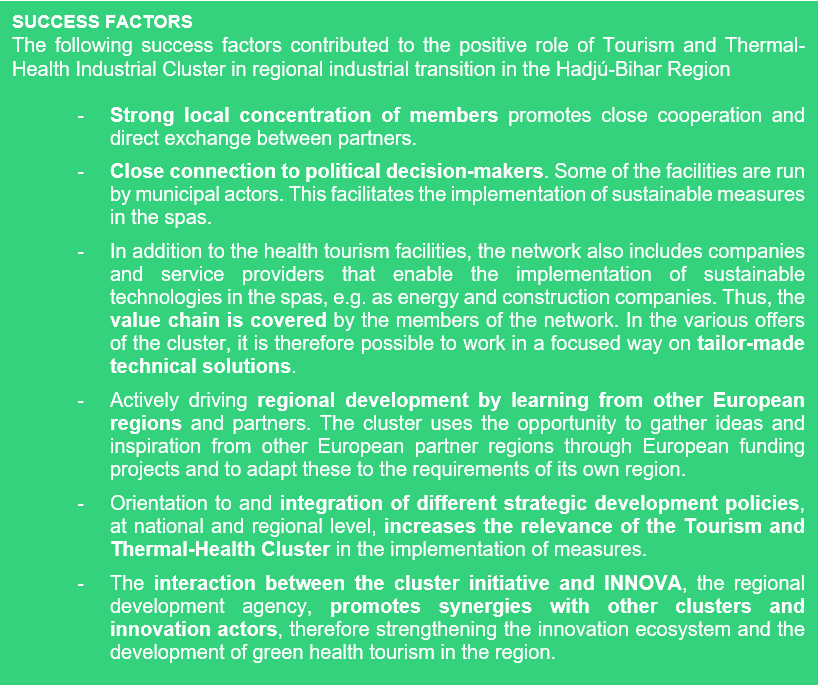
The Tourism and Thermal-Health Industrial Cluster has established itself as a key actor within the regional industrial ecosystem. It is embedded in a structure of development strategies set at different political levels and therefore with different regional focuses. In principle, policy-making authority in Hungary lies predominantly at the national level, so the region has to find answers to the development goals set by the national government. The cluster initiative forms a bridge between national, sectoral development objectives and the long-term strategic orientation of regional development.
The long-term objective of all relevant policies is to make both the regional industries and the spa tourism sector more sustainable. For this purpose, the cluster initiative is working on a holistic approach to the use of thermal resources in the region, both in the wellness sector and in the field of renewable energies, in order to generate a circular economy. At the same time, the cluster initiative helps tourism facilities to become more internationally oriented through services in the terms of developing digitalisation and sustainable tourism in the sector. A key success factor for the cluster initiative is that almost all relevant actors based in the region are networked in the cluster. As a result, long-term developments can be offered in a targeted and demand-oriented manner, leading to a holistic development of the regional sector. To achieve this, the region and the municipal managers who form the management of the spas work closely with the cluster initiative. In addition, the cluster initiative is constantly interested in international projects and contacts in order to better understand the international standard and to be able to promote it in its own region.
The association of the cluster initiative is a strategically valuable approach for the region to expand the service portfolio for the members, even if the actual number of full-time employees of the cluster initiative is comparatively low. This fact is compensated by the contribution of INNOVA providing cluster management services. The interaction between the cluster initiative and INNOVA, the regional development agency, can facilitate synergies with other clusters and innovation actors, thus strengthening the innovation ecosystem, which is relatively small compared to other regions.
RECOMMENDATIONS
The case of the Tourism and Thermal-Health Industrial Cluster and the Hadjú-Bihar region shows how a region that is strongly evolving is mainly developing through political and strategic impetus. However, the implementation of strategic objectives and measures cannot succeed without functioning “agents of change”. The Tourism and Thermal-Health Industrial Cluster can successfully implement the transition towards a greener health tourism by including almost all spas and at the same time covering the necessary technology and service providers. Yet, the cluster does not act exclusively as an operational hand for developmental strategies, but provides members with access to international partners and good practices through participation in European projects. As a result, the cluster strengthens the perception of the region abroad and at the same time promotes the awareness of regional actors for influencing factors in international competition.